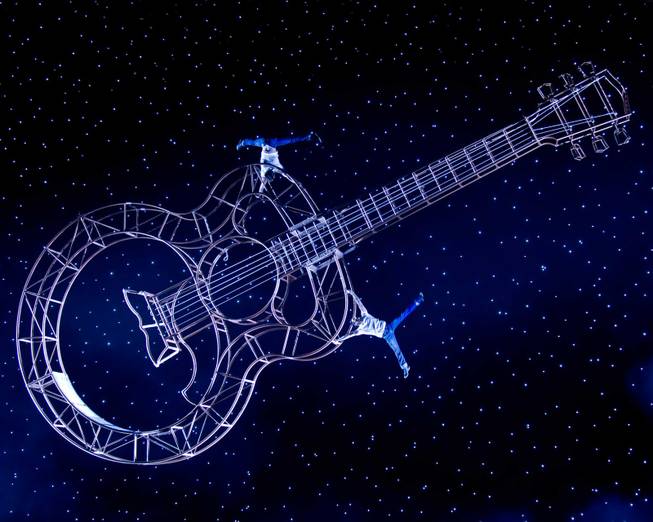
Julie Aucoin/Cirque du Soleil
Cirque du Soleil’s Viva Elvis at MGM CityCenter’s Aria.
Tuesday, Feb. 23, 2010 | 12:21 p.m.
Viva Elvis Blue Carpet
Celebrities walk the blue carpet at Aria for the premiere of Viva Elvis.
Cirque du Soleil has finally brought to the stage, or stages, a debate once confined to arguments among fans of contemporary music: Who do you prefer, The Beatles or Elvis Presley?
There's no point in dancing around this one. Cirque has brought similarly styled productions of the music, lives and legacies of The Beatles and Elvis on the same stretch of real estate in Las Vegas. In 2006, "Love" opened to largely laudatory reviews at The Mirage. "Viva Elvis" opened Friday Night to Dow Jones (up and down) reviews at Aria.
Each show is authorized by the companies that control the licensing of the respective artists: Apple Corps (Paul McCartney, Ringo Starr, Yoko Ono and Olivia Harrison) for The Beatles; Elvis Presley Enterprises (most notably Priscilla Presley) for Elvis' estate. For a longtime Beatles nut who fairly recently became acutely educated about Presley, "Viva Elvis" was a chance to see what sort of whimsy Cirque would layer onto what might be the best-documented life and career in American entertainment history.
In researching Presley, and especially in several lengthy, dizzying conversations with some of the individuals who knew him intimately for more than two decades, I was struck by how powerful a figure he really was. Otherwordly, even. "When Elvis grabbed you, he never let you go," said Sonny West, one of the famed Memphis Mafia figures who was at Presley's side as a security official for more than 15 years before he and his cousin, Red, along with Dave Hebler, were fired by Presley's father, Vernon. I love the old quote by Tuesday Weld, too, who was a girlfriend of Presley's in the early-1960s and who starred opposite him in the 1961 film vehicle, "Wild in the Country." She said, "When Elvis entered a room, he took it over. He was so physically beautiful he would have been famous even if he had no talent."
The Beatles, of course, were wholly taken by Presley. As a teenager, upon seeing an ad for "Heartbreak Hotel," Paul McCartney said, "This is it: The Messiah has arrived." Upon meeting McCartney for the first time, in 1957, John Lennon later recalled, "I dug him. He looked like Elvis." When The Beatles met Presley in L.A. in 1965, they spent several moments just gazing at him, at which point Elvis said, "If y'all are just going to stare at me, I'm going to bed."
This is to put the influence of Presley in proper context, because as both musical legacies and biographies are portrayed by Cirque on the Strip, "Love" is far more rewarding. It's because of the music, naturally. The music of The Beatles is far better aligned with the obtuse, groundbreaking sense of entertainment that has made Cirque an international phenomenon and the dominant entertainment production company in Las Vegas. As Elvis played essentially the same film character 31 times over, The Beatles proved more inventive in their songwriting, their use of instruments, experimentation with new studio techniques and in forging a message beyond just, "please buy this album."
Consider: In 1966, The Beatles released an album called "Revolver." It was the follow-up to "Rubber Soul," the album that provided the first concrete evidence this band was planning to expand its art beyond the ritualistic toe-tapping, finger-snapping releases of the previous three years. When listing The Beatles' best albums, you wouldn't be faulted for dropping "Revolver" at the top, yet The Beatles catalog is so strong some fans might list three or four albums before "Revolver."
The sitar was featured prominently on this wildly imaginative album, especially on "Tomorrow Never Knows," which John Lennon wrote while inspired by the Tibetan Book of the Dead. Segments of "And Your Bird Can Sing" were played backward. "Taxman," written by George Harrison, was an angry response to the pocket-picking British tax system. "Yellow Submarine" was practically a children's song, the refrain arriving to Paul McCartney as he came out of a deep sleep. "Eleanor Rigby," about a lonely priest and a friendless spinster, is still powerful today. There is a modern-day incarnation of Eleanor Rigby who actually operates near Elvis' onetime Vegas home, the Las Vegas Hilton. She's a sad-faced woman who asks for money while limping between idling vehicles near the corner of Paradise Road and Sahara Avenue.
Most Beatles' music, from especially from "Rubber Soul," forward, speaks to issues we face today. The band grew from a veritable boy band in 1962 to cultural and musical trailblazers in fewer than four years.
Consider, then, the music Presley put out the year "Revolver" was released: Three movie soundtracks, "Frankie and Johnny," "Paradise, Hawaiian Style" and "Spinout." This follows two releases from 1965, "Girl Happy" and "Harum Scarum." It was obvious Presley's conscious decision to enter into a lucrative film career came at an artistic price. The film work blunted his musical creativity. This is made clear during "Viva Elvis" when Cirque seems to stretch its imagination like one of its ubiquitous bungee chords to incorporate its famous visual imagery into Elvis numbers. I've already noted the odd placement of superhero-costumed trampoline artists and western-attired dancers wielding flaming lassos in "Viva Elvis." Elvis' great period, the early Sun recordings dating from 1955 until he entered the Army in 1958, remain some of the greatest rock 'n' roll music ever recorded. But it isn't enough to carry a 90-minute show starring dozens of Cirque acrobats.
Comparatively, in "Love," most Cirque elements are so easy to imagine. I can envision the delight the Cirque production team took in considering how to handle, "Lucy In The Sky With Diamonds" — the song's title gives you "sky" already, which is where Cirque performers often seem most at home. "Being for the Benefit of Mr. Kite" is actually taken from a circus poster, verbatim, providing Cirque with another clear opening for circus-style treatment. Even the plea in "Help," gave Cirque an opening to bring out young guys on skateboards happily looping through a pair of half-pipes.
"Viva Elvis" uses a silk white sheet to show footage of Pricilla and Elvis' wedding ceremony at the Aladdin. It's a moving moment, but you can't help but think of how the same type of sheet is stretched over the audience in "Love" as "Tomorrow Never Knows" is mashed with "Within You/Without You," the slamming drumbeat offset by Harrison's filtered, circling vocals and the song's insistent single-chord guitar work. I've read one review comparing the two shows that actually criticized "Love" because it is "all about the music." Yes, allowing George and Giles Martin access to the entire collection of recorded Beatles music, raking it clean digitally, mashing it into a single soundscape and running it through a peerless 6,600-speaker sound system was such a bad idea.
Frankly, one of the problems I have with "Viva Elvis" is that many songs are sung live, and as such by someone who is not Elvis Presley. I'm listening to his "Elvis 30 #1 Hits" compilation now, and those early songs, especially, just rock. But in the show, we have a gospel interpretation of "All Shook Up," when Elvis' version is infinitely more powerful. Drawing out that distinctive, moving voice, rather than burying it, would have given "Viva Elvis" far more impassioned, emotional lift.
"Love" ends with a soaring take on "All You Need is Love," with sheen screens showing images of all four Beatles. "Viva Elvis" closes with a loud Vegas revival of "Suspicious Minds" and "Hound Dog." I talked to people exiting the theater after both these shows opened, "Love" four years ago and "Viva Elvis" on Friday. Those leaving "Love" were about speechless. One man, probably close to 60, came out shaking his head, saying, "I need to see it again, because I'm not sure what I just saw." Upon leaving "Viva Elvis," a friend turned to me and said, simply, "Well, that was fun." Yep, "Viva Elvis," is a whole lotta fun, but no matter how much we love Elvis, it's not "Love."
Follow John Katsilometes on Twitter at twitter.com/JohnnyKats.

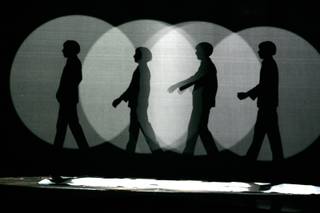
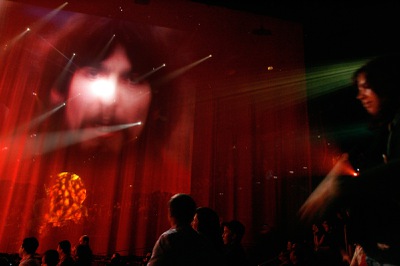
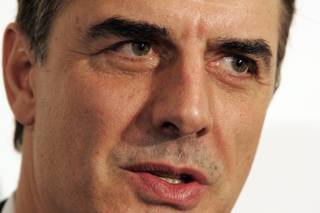
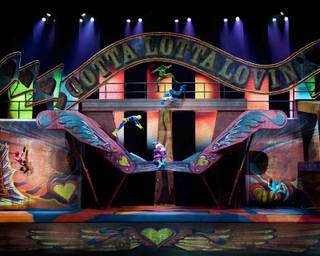

Join the Discussion:
Check this out for a full explanation of our conversion to the LiveFyre commenting system and instructions on how to sign up for an account.
Full comments policy